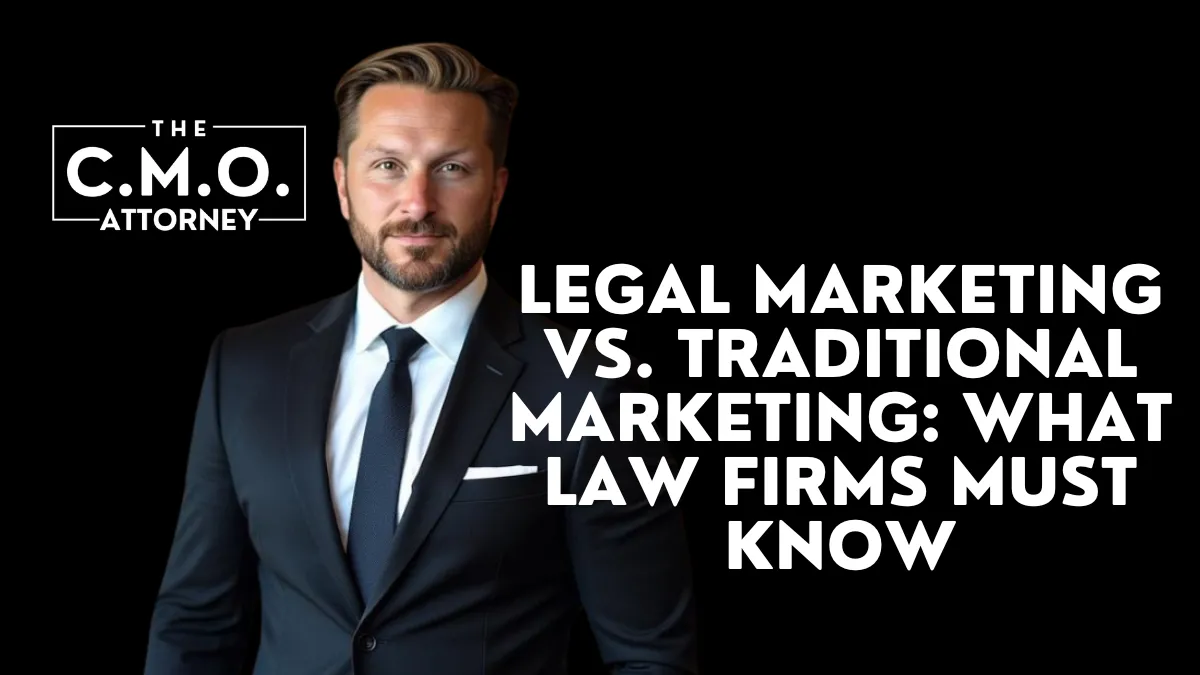 The difference between legal marketing vs traditional marketing is no longer optional—it’s a strategic necessity. At The CMO Attorney, we specialize in helping law firms transition from outdated advertising models to intelligent, data-driven marketing systems designed for the digital age. If you’re still investing heavily in billboards, TV ads, and Yellow Pages listings, it’s time to re-evaluate your marketing strategy and modernize your approach to lead generation, branding, and client acquisition.
The difference between legal marketing vs traditional marketing is no longer optional—it’s a strategic necessity. At The CMO Attorney, we specialize in helping law firms transition from outdated advertising models to intelligent, data-driven marketing systems designed for the digital age. If you’re still investing heavily in billboards, TV ads, and Yellow Pages listings, it’s time to re-evaluate your marketing strategy and modernize your approach to lead generation, branding, and client acquisition.
Sign up for a free consultation and let us show you how a Fractional CMO can unlock your law firm’s full marketing potential.
The Core Difference: Legal Marketing vs Traditional Marketing
Legal marketing vs traditional marketing is not just a debate between old and new—it’s a matter of precision versus broad guessing. Traditional marketing includes methods such as:
- Newspaper ads
- Radio spots
- Television commercials
- Flyers and brochures
- Sponsorships
- Billboards
While these methods have their place in building local awareness, they lack one critical feature: measurability. Traditional campaigns make it difficult to accurately track ROI or determine which ads drove results.
In contrast, legal marketing is digital-first and data-backed. It includes:
- SEO (Search Engine Optimization)
- PPC (Pay-Per-Click) Advertising
- Content Marketing
- Social Media Campaigns
- Email Marketing
- CRM Automation
- Online Reputation Management
Unlike traditional methods, these digital tactics are measurable, scalable, and highly targeted, giving law firms the ability to adapt and optimize in real time.
Why Traditional Marketing Falls Short for Law Firms
The nature of legal services demands trust, authority, and timeliness. When a potential client searches for an attorney, they are looking for immediate help. Traditional marketing rarely captures this urgent intent. A billboard might build brand recognition, but it won’t show up on Google at the moment someone types “personal injury lawyer near me.”
Other reasons traditional marketing underperforms in the legal sector:
- Delayed ROI: Results take weeks or months to appear—if at all.
- Lack of Analytics: You can’t fine-tune what you can’t measure.
- One-Size-Fits-All Messaging: No personalization or segmentation.
- High Cost with Low Conversion: Mass reach doesn’t equal qualified leads.
The Power of Legal Marketing in 2025 and Beyond
When evaluating legal marketing vs traditional marketing, it’s clear that legal marketing aligns with modern consumer behavior. More than 97% of people use the internet to find local services—including attorneys. If your firm isn’t visible online, you’re invisible to most of your market.
Legal marketing empowers your firm to:
- Dominate Local Search Results with SEO
- Capture Immediate Leads through PPC campaigns
- Nurture Long-Term Relationships with automated email follow-ups
- Build Brand Authority through expert blog content and client testimonials
- Enhance Your Online Reputation via Google and Yelp reviews
- Target Specific Demographics with advanced advertising filters
These aren’t just buzzwords. They are the building blocks of a scalable and high-performing client acquisition system that runs 24/7.
SEO: The Cornerstone of Legal Marketing
A major battleground in legal marketing vs traditional marketing is search engine optimization (SEO). Unlike a newspaper ad that runs for a week, SEO provides long-lasting visibility for your law firm across Google search results.
SEO for law firms includes:
- Optimizing your website for speed, security, and mobile responsiveness
- Building backlinks from high-authority websites
- Targeting local search phrases like “car accident lawyer in Tampa”
- Publishing long-form, keyword-optimized blog content
- Managing your Google Business Profile for reviews and map listings
Firms that invest in SEO not only reduce their cost per lead over time but also establish themselves as market leaders in their specific legal niches.
Paid Advertising vs Organic Reach
When comparing legal marketing vs traditional marketing, paid advertising (PPC) gives you what traditional ads can’t: instant lead generation with trackable metrics. Google Ads, Meta Ads, and YouTube pre-rolls allow you to:
- Target users by ZIP code, device, age, interest, and behavior
- A/B test multiple ads and optimize based on performance
- Use call tracking to attribute leads directly to campaigns
- Retarget visitors who didn’t convert the first time
Unlike TV or radio, digital advertising allows daily optimizations that continuously improve performance and maximize your ad spend.
Content Marketing Builds Authority and Trust
Content is the foundation of your online brand. When a potential client reads an article titled “What to Do After a Car Accident in Florida,” they begin to trust your expertise. This is where legal marketing vs traditional marketing excels: delivering useful, SEO-rich content that positions your firm as an authority.
Legal marketing vs traditional marketing becomes starkly clear in this context—traditional ads push a message outward; content marketing pulls clients in by providing them with the exact information they’re searching for.
At The CMO Attorney, we build content funnels that guide your potential clients from awareness to conversion through every stage of the buyer’s journey.
Social Media: Amplifying Your Legal Brand
Social media may not replace search engines, but it plays a crucial supporting role in your digital ecosystem. Posting consistent, educational, and engaging content on platforms like Facebook, LinkedIn, Instagram, and TikTok increases:
- Brand visibility
- Community engagement
- Referral potential
- Website traffic
It also allows your firm to show its human side, which builds deeper trust—something no traditional advertisement can achieve at scale.
Data-Driven Decision Making
Perhaps the most important distinction in legal marketing vs traditional marketing is the role of analytics. Every single dollar you spend in digital marketing is measurable.
You gain:
- Real-time dashboards to track leads
- ROI metrics per campaign
- Behavior flow of your website visitors
- Heatmaps to show where users are engaging
- Detailed reports that inform smarter strategies
We use this data at The CMO Attorney to cut underperforming tactics and double down on what works—saving you money and improving results.
Reputation Management: A Critical Component of Legal Marketing
In the competitive world of law, your online reputation is just as important—if not more—than your actual legal expertise. Reputation management is a cornerstone of legal marketing vs traditional marketing that is often overlooked. Traditional marketing doesn’t allow for real-time feedback or any engagement with past clients, making it harder to manage and maintain your firm’s reputation.
In digital marketing, however, you have control over how your firm is perceived across multiple platforms, from Google reviews to social media comments. Clients increasingly turn to online reviews to determine whether they should hire a lawyer, with 80% of consumers trusting online reviews as much as personal recommendations.
Here’s how reputation management enhances your legal marketing strategy:
Monitor Reviews Across Platforms
Google, Yelp, Avvo, and Facebook are some of the primary platforms where potential clients will find and evaluate your law firm. At The CMO Attorney, we implement tools to track reviews in real-time, ensuring that you respond promptly to both positive and negative feedback. Addressing complaints or negative reviews quickly and professionally can turn a dissatisfied client into a loyal one and demonstrate to others that you care about customer satisfaction.
Solicit Positive Reviews
Asking satisfied clients to leave reviews on multiple platforms increases the visibility of your firm. While traditional marketing like TV ads may build brand awareness, online reviews help build trust and provide social proof. A strong portfolio of positive reviews can give you a significant advantage in local SEO rankings as well, helping your law firm show up higher in Google searches.
Engage with Clients on Social Media
Social media platforms allow law firms to engage directly with clients and the community. Responding to comments, sharing client success stories, and showing appreciation for positive feedback on platforms like Instagram and LinkedIn can boost your reputation. Traditional marketing lacks this kind of engagement and often leaves potential clients feeling disconnected from the brand.
Leverage Case Studies and Testimonials
While negative reviews need to be managed carefully, case studies and client testimonials can be incredibly powerful tools for building a positive online reputation. Legal marketing vs traditional marketing reveals that clients looking for legal representation are more likely to trust your firm if they see real-world examples of how you’ve successfully helped others. Creating detailed case studies and gathering testimonials directly from clients can build authority and trust while enhancing SEO.
Address Negative Reviews Strategically
When a negative review does appear, it’s important to handle it strategically. A thoughtful, empathetic response can demonstrate your firm’s commitment to service and problem-solving. By showing that your firm addresses complaints, you not only resolve individual issues but also create a public record of your professionalism and commitment to quality service.
James Frazier | The CMO Attorney | Fractional CMO
Future-Proof Your Firm with Legal Marketing
In the clash of legal marketing vs traditional marketing, there’s a clear winner. Digital legal marketing offers cost-efficiency, scalability, accountability, and real-time performance optimization. Traditional marketing, while still valuable in rare cases, simply can’t compete in today’s on-demand, search-driven environment.
At The CMO Attorney, we help law firms like yours leave behind the limitations of legacy advertising and embrace modern growth systems that produce real, measurable results.
Sign up for a free consultation today and discover how legal marketing can transform your practice.
Sources:
-
American Bar Association – 2023 Legal Technology Survey Report
A trusted annual report revealing how law firms use and benefit from modern digital marketing tools.
https://www.americanbar.org/groups/law_practice/publications/techreport/ -
National Law Review – Marketing Strategies for Law Firms
Offers in-depth insights into current best practices for law firm marketing.
https://www.natlawreview.com/article/law-firm-marketing-2023-guide -
Clio – Legal Trends Report
A comprehensive annual study analyzing client behavior, law firm growth metrics, and technology adoption.
https://www.clio.com/resources/legal-trends/
